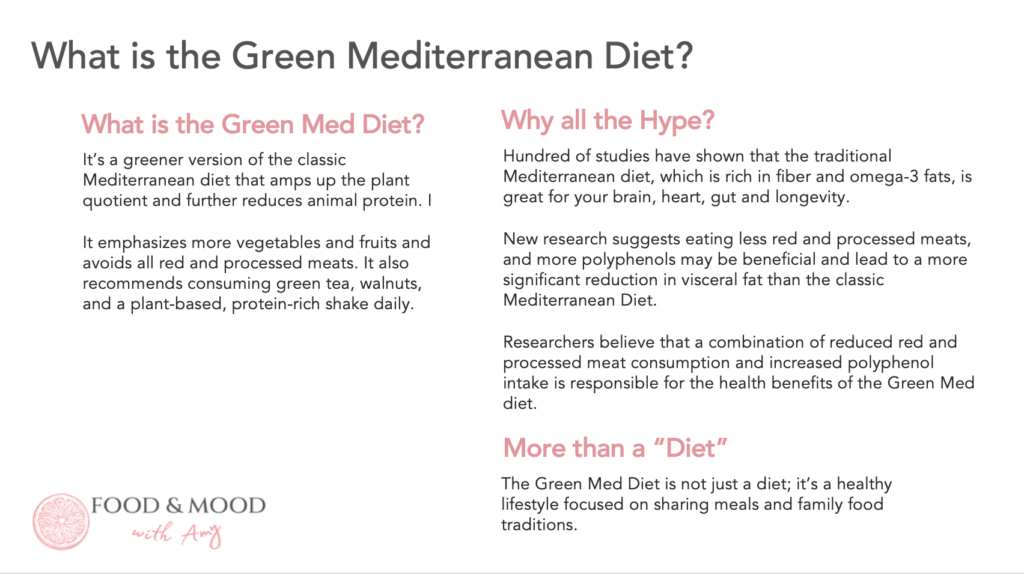New studies suggest that a tweaked version of the Mediterranean diet may help burn fat faster and provide heart benefits. Researchers say a new “green” Mediterranean diet may be healthier than the traditional Mediterranean diet. Could this be the “perfect” diet for health and longevity?
The research found that the Green Mediterranean Diet is more effective at reducing visceral fat (the fat around your waist) classic Mediterranean diet or a generally healthy diet. So, what does this really mean?
The results from this study may be provocative, but I am cautiously optimistic. We all know diets, in general, are hard to stick to, but the Green Mediterranean Diet is highly restrictive (and super low calorie!). More than 85% of diets fail, and research has shown that most people gain weight back within a year or less. Researchers from this study mention that participants followed the diet for only six months when almost all dieters lose weight quickly. After that initial loss, dieters (on any diet) tend to regain weight slowly. I’m wary of any diet with specific rules about the foods you can or cannot eat. For long-term weight loss, the name of the game is consistency and adopting sustainable healthy habits for the long run.
While there is still a lot to be learned, there’s promise in the Green Mediterranean Diet for weight loss and protection against diabetes and other metabolic diseases.
Differences Between the Green Mediterranean Diet and the Normal Mediterranean Diet
The traditional Mediterranean Diet includes vegetables, fruits, whole grains, sources of healthy fats, moderate amounts of dairy and fish, less red meat than a typical American diet, and red wine in moderation. The Green Mediterranean Diet is the next-generation Mediterranean Diet that’s more plant-forward. It emphasizes more vegetables and fruits and avoids all red and processed meats. It also recommends consuming green tea, walnuts, and a plant-based, protein-rich shake daily. Some limited research suggests eating less red and processed meat while eating more polyphenols may be beneficial, leading to a more significant reduction in visceral fat than the classic Mediterranean Diet.
Thoughts about the Green Mediterranean Diet and Visceral Fat
The study showed that people who followed the Green Mediterranean Diet had significantly higher ghrelin levels than people who followed a traditional Mediterranean diet. Ghrelin is a hunger hormone that interacts with other hormones to help regulate hunger and satiety. Increased levels may help people lose fat while improving insulin sensitivity. The Green Mediterranean Diet is also supercharged with polyphenols. Research has shown that polyphenols have weight loss properties and may help to boost metabolism and decrease appetite.
Who Shouldn’t Try the Green Mediterranean Diet
The Green Mediterranean Diet is safe for most people. However, consult your doctor if you are pregnant or have digestive issues (like celiac disease or lactose intolerance). It’s always a good idea to check with your physician before starting any new diet or nutrition intervention.
Other Thoughts…
A study published in March 2021 found that adults who consumed five servings of fruits and vegetables daily had a lower risk of overall death and dying from cardiovascular disease, respiratory disease, and cancer. Researchers studied diet and mortality among more than 100,000 men and women in the United States over three decades. The bottom line is that fad diets come and go, but research consistently shows that a diet high in a variety of whole fruits and vegetables leads to improved health, including weight loss. The study also revealed that not all fruits and vegetables are created equal, and there is no added benefit to eating more than five servings daily.
Want to learn more? Check out these recipes and tips about the Mediterranean Diet.

The Green Med Diet Cheat Sheet











Leave A Comment